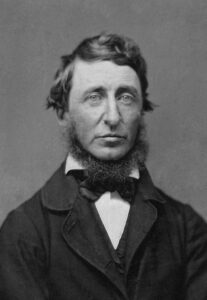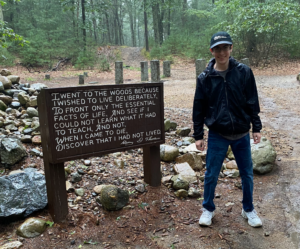Calling someone “simplistic” tends to be interpreted as an insult. For philosopher Henry David Thoreau however, he very well might find that to be a compliment. Thoreau (1817-1862), of Concord, Massachusetts, spent two years living in the woods by Walden Pond. He wanted to reduce life “to its lowest terms.” “Our life is frittered away by detail,” Thoreau argues. “Simplicity, simplicity, simplicity! I say let your affairs be as two or three.” The cabin that he built cost only $28. So, why did he do this?
Thoreau saw many problems stemming from the growth of industrialization and materialism in what he called the “restless, nervous, bustling, trivial Nineteenth Century.” (Sound familiar?) He rebuked what he felt were too many people subservient to the system and society at the expense of their true selves.
“The laboring man,” Thoreau writes, “has no time to be any thing but a machine.” He felt that as a society we are hyper fixated on labor, menial activity, and shallow materialistic pursuits and not truly enjoying the “finer fruits” of life. Among his most notable sayings: “The mass of men lead lives of quiet desperation.”
Believing the most valuable way to experience what life has to offer is first hand, Thoreau rejects submitting to other peoples’ supposed wisdom, claiming that “I have yet to hear the first syllable of valuable or even earnest advice from my seniors.” According to Thoreau, “man’s capacities have never been measured; nor are we to judge of what he can do by any precedents, so little has been tried.”
He dismissed the idea of adhering to metrics and expectations created by others, and external definitions of a good life. “The life which men praise and regard as successful is but one kind,” he states. “Why should we exaggerate any one kind at the expense of the others?”

He rejected comparative thinking. “If a man does not keep pace with his companions, perhaps it is because he hears a different drummer. Let him step to the music which he hears, however measured or far away.”
He also lambasted the “superfluities,” the unnecessary and meaningless nonsense in our lives. Wealth is superfluous, he maintains, for “the setting sun is reflected from the windows of the almshouse as brightly as from the rich man’s abode.”
As those familiar with Thoreau know, he applied his philosophy by taking on his own adventure at Walden Pond, in Concord. He chose to live a simple lifestyle there for two years. “I went to the woods because I wished to live deliberately, to front only the essential facts of life,” he wrote in his book, Walden, in which he describes his experience.
Thoreau criticized many aspects of everyday life that we might at first find essential, such as swift transportation. “If we stay at home and mind our business, who will want railroads?” Likewise with information: “I could easily do without the post-office.” And, he continues, “the penny-post is, commonly, an institution through which you seriously offer a man that penny for his thoughts which is so often safely offered in jest.” As for the news? “I am sure that I never read any memorable news in a newspaper.”
After two years at Walden Pond, Thoreau headed back to town. He wrote that “I left the woods for as good a reason as I went there. Perhaps it seemed to me that I had several more lives to live.”
I visited Walden Pond recently during a trip to my aunt and uncle’s in Cambridge, MA and it was during this time that I learned about Thoreau. The pouring rain created a stunning view as the pond glistened. A few people were swimming as well. Uncle Michael offered that we take a 20 minute trip (both ways) along a trail in that woodsy area, so we could visit the location of Thoreau’s simple shelter.

As we’re standing there in the heavy rain I think it over for a moment. I figured it would be nice to use this opportunity to take a picture at the site. “All right,” I say. “Let’s do it.” So we walk along this trail. Despite some limited cover from the trees, we are soaked. After visiting the site where the house once stood we immediately start to head back…only to accidentally go down the wrong path and get lost in the woods.
The trail had essentially turned into a maze. But eventually we managed to circle back to the site, finding the correct path from there. Later, after settling down at my aunt and uncle’s house, I opened up Walden and began reading.
Thoreau had said “it is remarkable how easily and insensibly we fall into a particular route, and make a beaten track for ourselves.” I told my uncle that perhaps Thoreau’s spirit was there that day — guiding, or should we say misguiding, us down the wrong route, and into a memorable story.
Like so many of us, Thoreau had faced rejection and closed doors among his fellow townspeople. “I turned my face more exclusively than ever to the woods, where I was better known,” he wrote. Seizing initiative, he did not allow others to dictate the direction of his life. Thoreau had escaped the artificial boundaries to the artificial achievements society offered and embraced the simplified, natural life — a life that anybody, regardless of background, can enjoy.
To be sure, Thoreau’s point is not that everybody should live out the rest of their days in the woods (he certainly didn’t). But he learned about the essentials of life, and saw more clearly all the fluff that society contains — something we all should be conscious of. “In proportion as [one] simplifies his life,” Thoreau asserts, “the laws of the universe will appear less complex.”
As we celebrate Sukkot, let us remember that a major theme for this holiday is simplicity. We filter out the non-essentials and gather around with family and friends. We highlight the protection we receive from Hashem as we find ourselves at the mercy of nature when we eat — and for those of us living on the wild side, sleep — in the Sukkah. We engage in an endeavor reminiscent of Thoreau, and like him, we simplify. In a sense, he lived in a sukkah for two years (albeit not quite a kosher one).
Our family always decorates the sukkah with quotes from philosophers, authors, and other influential figures. You bet we will make room for Thoreau this year.